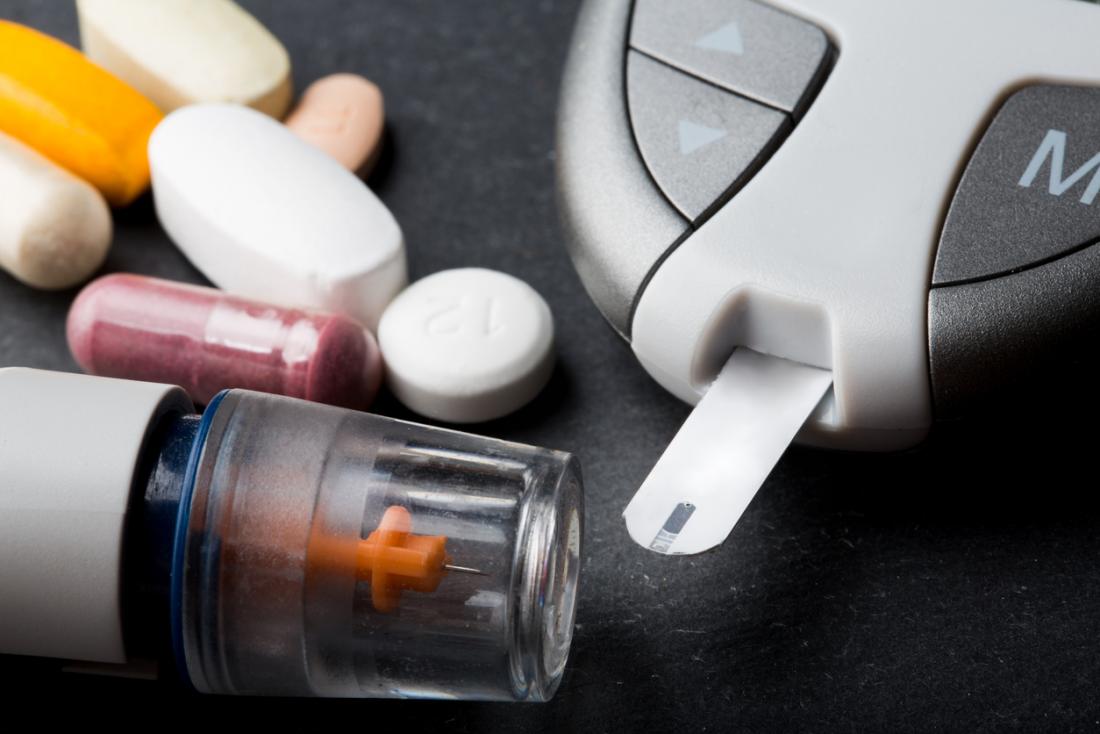The list of Type 2 diabetes medications is long and confusing. Take some time to learn about these diabetes drugs, how they are used, what they do, and the associated side effects. This can help you get ready to discuss with your doctor about diabetes treatment choices that are appropriate for you.
Lowering blood sugar with diabetes medications
The blood sugar target for most adults with diabetes mellitus is an A1C of below 7%. (A1C measures an individual’s average blood sugar over three months). Diet and exercise are often insufficient to achieve this goal, and one or more medicines may be required. Several classes of Type 2 diabetes medicines are available. Each class of diabetes medicine works in a different way to lower blood sugar levels. Here are the best medicines for diabetes in terms of effectiveness in lowering A1C and blood sugar levels.
-
- Insulin (long-and rapid-acting):
Patients who have type 1 diabetes must be given insulin, as the beta cells in their pancreas no longer produce insulin (a hormone that plays a crucial role in glucose uptake and is needed by the muscle and adipose tissue). However, insulin injections are not only for patients with type 1 diabetes; those with Type 2 may also be given insulin, but generally only after failing to reach the target blood glucose levels after being treated with multiple oral medications for some time.People with diabetes typically get multiple injections daily, including bolus insulin shots administered before meals and the long-acting basal insulin that reduces the sugar level in the bloodstream. Insulin is categorized under the class of high-risk medications because it can cause episodes of hypoglycemia, but the benefits of this type 1 diabetes treatment surely outweigh the risks. The two most prescribed insulins are Basaglar and Novolog.
- Metformin:
The first line of oral medication for diabetes patients is Metformin, which can also treat pre-diabetics. It is made to lower glucose production in the liver, increasing insulin sensitivity and decreasing intestinal sugar absorption. Metformin pills have been shown to reduce A1 levels by 1% to 2% fasting sugar levels by an average of 25%.Depending on the severity of this metabolic disorder, the doctor advised Metform in combination with lifestyle modifications as monotherapy before adding more medications to the patient’s treatment regimen. The oral diabetes agent is well tolerated, though in starting, patients may experience gastrointestinal problems, such as diarrheal, abdominal cramping, and flatulence.
- Glipizide:
If the target blood sugar levels are not achieved after three months of taking Metformin, healthcare providers may then choose to add another oral antidiabetic agent, Glipizide, belonging to sulfonylurea, to a patient’s regimen. This diabetes medicine helps stimulate the production of insulin hormone from the beta cells in the pancreas, which causes a significant reduction in postprandial blood glucose. Glipizide is used in Type 2 diabetes treatment. It should not be given to individuals with Type 1 diabetes because it can’t be combined with insulin, which is a required treatment for patients with Type 1 diabetes. When used in combination with insulin, Glipizide gives rise to severe hypoglycemia, which should be avoided.The diabetes medicine has been shown to reduce A1C levels and works best when used half an hour before a meal. While taking Glipizide, a diabetic patient may develop nausea and weight gain. The medicine is extremely effective at increasing insulin production, but its effectiveness reduces after long-term usage as the beta cell function may begin to decline.
- Insulin (long-and rapid-acting):

- Glimepride:
Glimepride works the same way as Glipizide, sharing the same class of medications. One difference is that it is not typically given along with Metformin, as there is an increased risk of hypoglycemia when they are used in combination. Glimepiride is a once-daily medicine that should be consumed with the very first meal of the day.The medicine works best when used in combination with diet and regular exercise. This medicine is associated with the least weight gain among all sulfonylureas and is especially recommended for patients with heart disease.
- Invokama:
If a diabetes patient suffers from a sulfa allergy, the previous two antidiabetic agents are not recommended, but Invokana may be. Invokana, a sodium-glucose cotransporter 2 inhibitor, works by inhibiting the sodium-glucose cotransporter, which causes a significant reduction in the reabsorption of filtered glucose. The medicine also causes the diabetes patient to excrete excess glucose via urine, lowering overall plasma glucose concentration.The oral antidiabetic agent has been shown to lower A1C levels but is particularly effective for most diabetes patients because of the significant weight loss it can bring about. There are a few disadvantages to using Invokana, including increased thirst and urination. Patients may also develop more frequent infections, such as urinary tract infections, due to the sugar excreted in their urine, as it is well-known that bacteria love sugar. Diabetes medicine is often used in combination with Metformin.
- Januvia:
It regulates blood glucose levels by increasing insulin production from the beta cells and lowering glucagon production. Januvia is believed to enhance the body’s incretins. The medicine has been shown to reduce A1C levels and significantly reduce postprandial blood glucose levels. Patients taking Junuvia tablets may experience rash, edema, and urinary tract infections.
- Glimepride:
While these diabetes pills certainly have more to offer than just improvements in blood glucose levels, they remain inaccessible and costly to many people worldwide. This is why having an open conversation with your healthcare professional about what is necessary for you and what goes with your goals and preferences is important.
Also Read: The pros and cons of high blood pressure medication
admin
Latest posts by admin (see all)
- What is Triluma Cream? Uses, Benefits, and How It Works for Skin - December 26, 2024
- What Causes Dark Spots? Understanding the Science of Hyperpigmentation and How Skin Lightening Products Help - December 26, 2024
- Tretinoin Gel vs. Cream: Which Formulation is Right for Your Skin? - December 20, 2024



